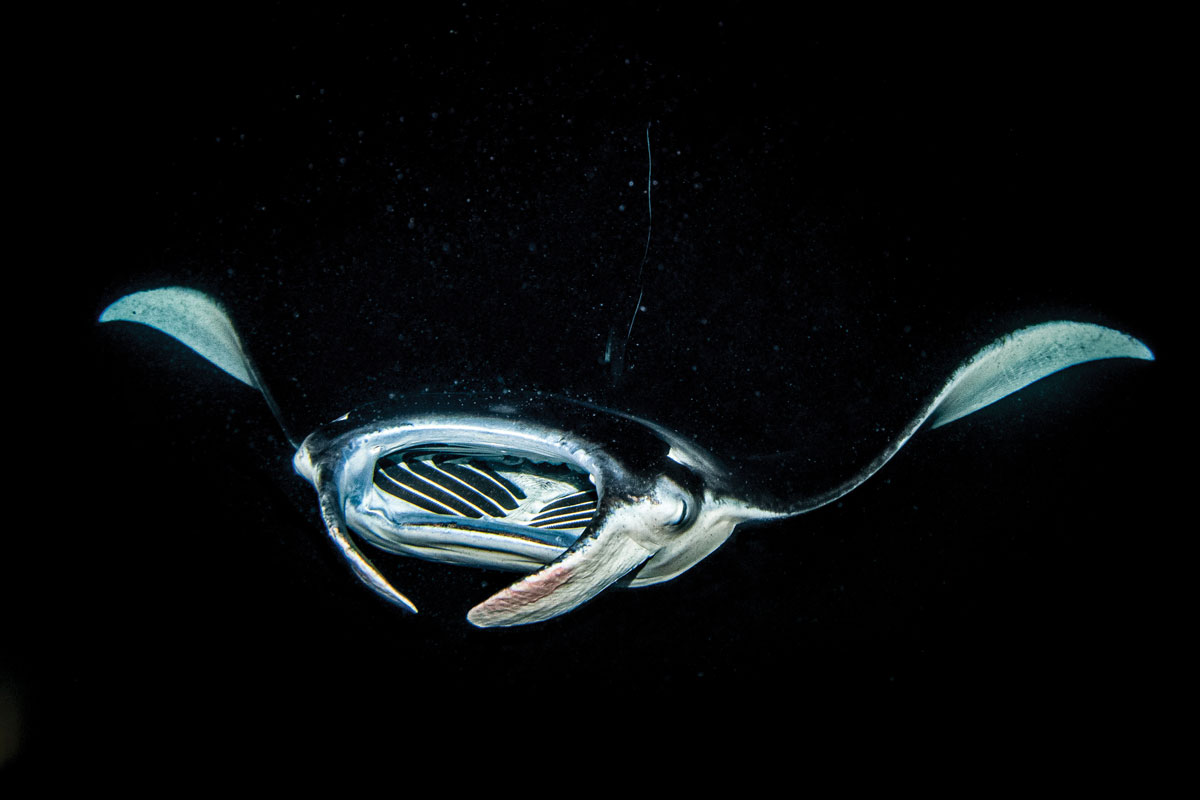Are Manta Ray Night Dives Ethical?
Question: Are manta ray experience dives really ethical if they use the ship's lights to attract plankton and, therefore, mantas? - Richard T, Pittsburgh
Answer: With some basic best practices in place, these experiences can be win-win for humans and manta rays, but poorly managed experiences can cause stress or injury to the rays.
Before I get into the ethics of responsible wildlife tourism with mantas, let’s first explain a typical “dive with manta rays” setup for those of you who haven’t experienced one. Manta rays, which are popular sighting for divers and in serious conservation trouble, are filter feeders that eat plankton. You can’t “chum” for manta rays they way some dive operations do for sharks. However, by shining lights underwater at night, plankton aggregate, and the mantas come in to filter feed. When I did this off Kona, we knelt in a circle, a big light was set on the bottom, and half a dozen giant mantas kept swooping right over our heads to feed on the plankton in the column of light. It was one of the most amazing things I’ve ever seen.
Proponents of this claim that it’s not in any way harmful to the mantas, since they’re just attracting manta’s natural prey into a specific place. Some have even claimed that if this practice was stopped, mantas would starve to death, which is, not to put too fine a point on it, complete nonsense.
The reality is more complicated. The problem with some of these “dive with manta rays” operations is that they attract tons of people, and tons of boats. This is a recipe for causing injury or disease to mantas, as well as disrupting their natural behaviors. It can also cause physiological stress in the animals, which can have a variety of what scientists call “sublethal effects,” which means not killing the animals but making it so they don’t have the energy to migrate or reproduce or do normal manta ray things. This is exacerbated by the competition between dive operators, which makes some operators want to bend the rules to make sure their clients have the best encounter possible. Having so many divers and boats in the water causes general chaos, which has implications for diver safety as well.
Notice that I’ve stressed here that the problem is not tourism in general, but unregulated tourism and unscrupulous operators. Responsible interactions are possible, which can generate tons of money that help make these animals “worth more alive than dead” (to use a popular argument for the conservation benefits of wildlife tourism), giving divers an amazing experience, and causing minimal harm to mantas. There are many such guidelines, but the one I trust was co-written by WWF, PADI AWARE, and the Manta Trust—it can be viewed here. For mantas specifically (see table 6 in the report), they stress slow speed limits for boats, a maximum number of people in the water at a time, limited time with the animals, no touching the animals at all, and lots of other important science-based guidelines.
I loved my “dive with the mantas” experience, and I hope that appropriate regulations will be put into place so that others can continue to enjoy experiences like this well into the future. Unscrupulous dive operators risk ruining this for everyone.
Ask a Marine Biologist is a monthly column where Dr. David Shiffman answers your questions about the underwater world. Topics are chosen from reader-submitted queries as well as data from common internet searches. If you have a question you’d like answered in a future Ask a Marine Biologist column, or if you have a question about the answer given in this column, email Shiffman at This email address is being protected from spambots. You need JavaScript enabled to view it. with subject line “Ask a marine biologist.”
Dr. David Shiffman is a marine conservation biologist specializing in the ecology and conservation of sharks. An award-winning public science educator, David has spoken to thousands of people around the world about marine biology and conservation and has bylines with the Washington Post, Scientific American, New Scientist, Gizmodo and more. Follow him on @WhySharksMatter on Twitter, Facebook and Instagram, where he’s always happy to answer any questions about sharks.
The views expressed in this article are those of David Shiffman, and not necessarily the views Scuba Diving magazine.

When you subscribe to the blog, we will send you an e-mail when there are new updates on the site so you wouldn't miss them.

